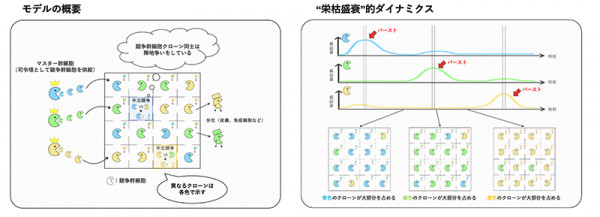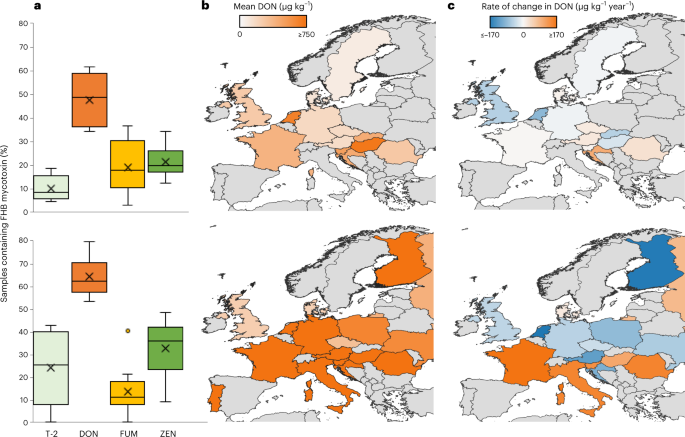標準治療にもかかわらず、がんが増殖する患者さんに、AIによる誘導治療が有効であることが判明 AI-guided treatments benefitted patients whose cancers grow despite standard therapy
2022-12-16 シンガポール国立大学(NUS)
この方法では、患者さんから小さな腫瘍のサンプルを採取し、これをリンパ腫に使用される厳選された12種類の薬剤とともに実験室で培養します。72時間後、QPOPは、この12種類の薬剤を用い、最大4種類の薬剤の組み合わせによる750以上の異なる薬剤の組み合わせに対する患者のがん細胞の潜在的な反応をランク付けします。
このQPOPの臨床応用研究は、シンガポール国立大学がん研究所(NCIS)の臨床医とシンガポール国立大学のがん科学研究所(CSIシンガポール)の科学者との共同研究であり、世界初の試みとなります。
これまでの研究では、生検から得られる組織の量に限界があるため、単剤の治療感度を予測することのみに焦点が当てられていました。QPOPの自動化されたワークフローとAI手法により、生検から得られる少量の組織でも併用薬感受性の研究に利用できるようになったのです。
この研究では、登録された71人の患者のうち65人がQPOPテストに成功し、生検から1週間以内に患者固有の組み合わせが特定されたことが示されています。標準治療に抵抗性を示すリンパ腫の患者さんのうち、17名が事前の臨床エビデンスと医師の判断に基づき、QPOPによる誘導治療を受けることになりました。
この17名のうち、5名の患者さんががんの兆候がなくなるなど、治療に対して完全奏効を達成しました。また、3名の患者さんが部分奏功を達成し、残りの9名の患者さんは病勢安定または病勢進行であった。
研究者らは、特に3ライン以上の治療を受けた患者さんにおいて、QPOP誘導治療後に病勢進行までの時間が短縮されたことを報告しました。QPOP誘導治療により、従来の標準治療と比較して、患者さんの無増悪生存期間(がんがこれ以上成長・拡大しない期間)が2倍以上延長されました。
<関連情報>
- https://news.nus.edu.sg/qpop-effective-in-personalising-drug-combinations-to-treat-relapsed-lymphoma/
- https://www.science.org/doi/10.1126/scitranslmed.abn7824
再発・難治性リンパ腫における薬物併用療法を導くためのex vivoプラットフォーム An ex vivo platform to guide drug combination treatment in relapsed/refractory lymphoma
Jasmine Goh ,Sanjay De Mel,Michal M. Hoppe ,Masturah Bte Mohd Abdul Rashid,Xi Yun Zhang,Patrick Jaynes,Esther Ka Yan Ng,Nur’Atiqa Diana Binti Rahmat,Jayalakshmi,Clementine Xin Liu ,Limei Poon,Esther Chan,Joanne Lee,Yen Lin Chee,Liang Piu Koh,Lip Kun Tan,Teck Guan Soh,Yi Ching Yuen,Hoi-Yin Loi,Siok-Bian Ng,Xueying Goh,Donovan Eu,Stanley Loh,Sheldon Ng,Daryl Tan,Daryl Ming Zhe Cheah,Wan Lu Pang,Dachuan Huang,Shin Yeu Ong,Chandramouli Nagarajan,Jason Yongsheng Chan,Jeslin Chian Hung Ha,Lay Poh Khoo,Nagavalli Somasundaram,Tiffany Tang,Choon Kiat Ong,Wee-Joo Chng,Soon Thye Lim ,Edward K. Chow, Anand D. Jeyasekharan
Science Translational Medicine Published:19 Oct 2022
DOI: 10.1126/scitranslmed.abn7824
Predicting possibilities with PDCs
Patients with non-Hodgkin’s lymphomas (NHLs) often relapse after frontline treatment, and interpatient heterogeneity make personalized combination treatment difficult. Goh et al. have developed a hybrid experimental-analytic method that they call quadratic phenotypic optimization platform, or QPOP, to identify personalized drug combination therapies using ex vivo patient samples to improve patient outcomes. In a prospective cohort, physicians were able to alter treatment according to drug combinations identified using QPOP after 6 days to achieve complete responses in 5 of 17 patients with NHL. This is a promising step for providing new hope for patients who have relapsed NHL and provides a foundation for further clinical trials.
Abstract
Although combination therapy is the standard of care for relapsed/refractory non-Hodgkin’s lymphoma (RR-NHL), combination treatment chosen for an individual patient is empirical, and response rates remain poor in individuals with chemotherapy-resistant disease. Here, we evaluate an experimental-analytic method, quadratic phenotypic optimization platform (QPOP), for prediction of patient-specific drug combination efficacy from a limited quantity of biopsied tumor samples. In this prospective study, we enrolled 71 patients with RR-NHL (39 B cell NHL and 32 NK/T cell NHL) with a median of two prior lines of treatment, at two academic hospitals in Singapore from November 2017 to August 2021. Fresh biopsies underwent ex vivo testing using a panel of 12 drugs with known efficacy against NHL to identify effective single and combination treatments. Individualized QPOP reports were generated for 67 of 75 patient samples, with a median turnaround time of 6 days from sample collection to report generation. Doublet drug combinations containing copanlisib or romidepsin were most effective against B cell NHL and NK/T cell NHL samples, respectively. Off-label QPOP-guided therapy offered at physician discretion in the absence of standard options (n = 17) resulted in five complete responses. Among patients with more than two prior lines of therapy, the rates of progressive disease were lower with QPOP-guided treatments than with conventional chemotherapy. Overall, this study shows that the identification of patient-specific drug combinations through ex vivo analysis was achievable for RR-NHL in a clinically applicable time frame. These data provide the basis for a prospective clinical trial evaluating ex vivo–guided combination therapy in RR-NHL.



